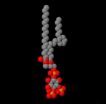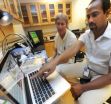(Press-News.org) TALLAHASSEE, Fla. - Kevin Speer has a "new paradigm" for describing how the world's oceans circulate — and with it he may help reshape science's understanding of the processes by which wind, water, sunlight and other factors interact and influence the planet's climate.
A Florida State University professor of oceanography with a passion for teaching, Speer and a colleague recently published a significant paper in the respected journal Nature Geoscience.
Working with John Marshall, an oceanography professor at the Massachusetts Institute of Technology, Speer reviewed — or essentially synthesized — vast amounts of previous data on ocean circulation (including their own earlier papers). As a result, they have created what Speer calls a new paradigm in the study of ocean currents on a global scale.
Here's how it works: Basically, the oceans, together with the atmosphere, rebalance heat on the planet. The sun shines on the Earth and heats up the tropics more than the poles. Near the poles, the ocean is cold and the water sinks; near the equator, the surface of the ocean is inviting and warm — and floats on top of the colder deep water.
So the question is this: Where does the water that goes down come back up?
Speer, Marshall and other oceanographers now believe that it comes back up in the Southern Ocean surrounding Antarctica — not as much in the warm oceans as had been previously thought.
"We're not saying that nothing comes up in the rest of the World Ocean, just that the main thrust is in the Southern Ocean," Speer said. "To a large extent it's driven by the wind."
Very strong winds, to be precise.
In the rough waters around Antarctica, sailors call those winds the "Roaring Forties" and the "Furious Fifties." They originate near the Equator, where hot air rises and then is pushed toward the North and South poles by cooler air that rushes in to take its place.
The resulting "eddy-driven upwelling" in the Southern Ocean, as Speer characterizes it, may in fact describe the most important process to date that helps scientists understand the role of the ocean and climate.
Speer, who holds a doctorate in physical oceanography from the prestigious Massachusetts Institute of Technology/Woods Hole Oceanographic Institution Joint Program, spent years living in France as an oceanographic researcher for a French governmental agency. (Yes, he's fluent in French.)
Today, from his office on the Florida State campus, Speer serves as interim director of the Geophysical Fluid Dynamics Institute (http://www.gfdi.fsu.edu/), a warren of intriguing laboratories just a few steps outside his door. It is there that Speer helps students and postdoctoral researchers learn about how climate works.
The laboratory's equipment includes a large, vintage rotating table designed nearly a half-century ago by the lab's founder, Florida State meteorology Professor Richard Pfeffer. (The device may be old, but it's one of the biggest and best in the United States, Speer says). Here students can recreate the ocean's churning and study natural phenomena such as the Antarctic circumpolar current.
Speer and his students have been studying ocean currents thanks to $2.5 million in funding from a larger $10 million National Science Foundation grant that FSU shares with eight other universities and institutions worldwide. Research has included releasing tracers and floats into the ocean to study the mixing and spreading of currents.
One of Speer's graduate students, Druv Balwada, recently took part in a joint U.S.-United Kingdom research program to study ocean currents aboard a ship in the Southern Ocean. To view the cruise blog of the nearly three-month voyage, visit http://dimesuk3.blogspot.com/.
"Our students learn and help in various ways," Speer said. "They certainly help generate some interesting and lively oceanographic research."
INFORMATION:
Speer and Marshall's Nature Geoscience paper is titled "Closure of the Meridional Overturning Circulation Through Southern Ocean Upwelling" (http://www.nature.com/ngeo/journal/v5/n3/full/ngeo1391.html).
How ocean currents affect global climate is a question oceanographer may be close to answering
A new way of thinking about ocean currents: Kevin Speer looks to the Southern Ocean for answers
2012-08-27
ELSE PRESS RELEASES FROM THIS DATE:
Compounds activate key cancer enzyme to interfere with tumor formation
2012-08-27
Scientists have known for decades that cancer cells use more glucose than healthy cells, feeding the growth of some types of tumors. Now, a team that includes researchers from the National Institutes of Health's new National Center for Advancing Translational Sciences (NCATS) has identified compounds that delay the formation of tumors in mice, by targeting a key enzyme that governs how cancer cells use glucose and its metabolites.
The study, published August 26 in the advance online publication of Nature Chemical Biology, was led by researchers from the Koch Institute ...
JCI early table of contents for Aug. 27, 2012
2012-08-27
New model of muscular dystrophy provides insight into disease development
Muscular dystrophy is a complicated set of genetic diseases in which genetic mutations affect the various proteins that contribute to a complex that is required for a structural bridge between muscle cells and the extracellular matrix (ECM) that provides the physical and chemical environment required for their development and function. The affects of these genetic mutations in patients vary widely, even when the same gene is affected. In order to develop treatments for this disease, it is important ...
New model of muscular dystrophy provides insight into disease development
2012-08-27
Muscular dystrophy is a complicated set of genetic diseases in which genetic mutations affect the various proteins that contribute to a complex that is required for a structural bridge between muscle cells and the extracellular matrix (ECM) that provides the physical and chemical environment required for their development and function. The affects of these genetic mutations in patients vary widely, even when the same gene is affected. In order to develop treatments for this disease, it is important to have an animal model that accurately reflects the course of the disease ...
The role of genes in political behavior
2012-08-27
Politics and genetics have traditionally been considered non-overlapping fields, but over the past decade it has become clear that genes can influence political behavior, according to a review published online August 27th in Trends in Genetics. This paradigm shift has led to novel insights into why people vary in their political preferences and could have important implications for public policy.
"We're seeing an awakening in the social sciences, and the wall that divided politics and genetics is really starting to fall apart," says review author Peter Hatemi of the ...
Review of new evidence to treat colonic diverticulitis may help doctors
2012-08-27
Recent evidence and new treatments for colonic diverticulitis that may help clinicians manage and treat the disease are summarized in a review in CMAJ (Canadian Medical Association Journal).
Diverticular disease, in which sac-like protrusions form in the wall of the colon, is common in developed countries, although it is increasing throughout the world, likely because of lifestyle changes. In people with the disease, about 25% will develop symptoms, which include abdominal pain and changed bowel habits, often leading to a diagnosis of irritable bowel syndrome. The widespread ...
Vitamin B3 may offer new tool in fight against 'superbugs'
2012-08-27
CORVALLIS, Ore. – A new study suggests that nicotinamide, more commonly known as vitamin B3, may be able to combat some of the antibiotic-resistance staph infections that are increasingly common around the world, have killed thousands and can pose a significant threat to public health.
The research found that high doses of this vitamin increased by 1,000 times the ability of immune cells to kill staph bacteria. The work was done both in laboratory animals and with human blood.
The findings were published today in the Journal of Clinical Investigation by researchers ...
Fitting Kv potassium channels in the PIP2 puzzle
2012-08-27
A recent study in the Journal of General Physiology brings new insights to an area of ion channel regulation: whether voltage-gated potassium (Kv) channels can be regulated by physiological changes to PIP2.
Potassium channels, microscopic pores that allow potassium ions to cross cell membranes, are crucial to such diverse processes as conduction of the nerve impulse, regulation of the heartbeat, and the secretion of hormones such as insulin. PIP2, a minor phospholipid component of cell membranes, regulates the activity of various proteins in the cell membrane, and ...
Leg compressions may enhance stroke recovery
2012-08-27
AUGUSTA, Ga. – Successive, vigorous bouts of leg compressions following a stroke appear to trigger natural protective mechanisms that reduce damage, researchers report.
Compressing then releasing the leg for several five-minute intervals used in conjunction with the clot-buster tPA, essentially doubles efficacy, said Dr. David Hess, a stroke specialist who chairs the Medical College of Georgia Department of Neurology at Georgia Health Sciences University.
"This is potentially a very cheap, usable and safe – other than the temporary discomfort – therapy for stroke," ...
Renal denervation improves blood pressure and arterial stiffness
2012-08-27
Munich, Germany – August 27 2012: Renal denervation improves blood pressure and arterial stiffness in patients with therapy resistant hypertension, according to research presented at ESC Congress 2012 by Mr Klaas Franzen from the University Hospital of Schleswig-Holstein. The findings suggest that renal denervation regenerates blood vessels and could reduce cardiovascular events.
Malignant arterial hypertension was historically treated with surgical thoracolumbar splanchnicectomy, a type of sympathectomy treatment that was introduced in 1938. "A significant reduction ...
Breast milk promotes a different gut flora growth than infant formulas
2012-08-27
DURHAM, N.C. – The benefits of breast milk have long been appreciated, but now scientists at Duke University Medical Center have described a unique property that makes mother's milk better than infant formula in protecting infants from infections and illnesses.
The finding, published in the August issue of the journal Current Nutrition & Food Science, explains how breast milk, but not infant formula, fosters colonies of microbiotic flora in a newborn's intestinal tract that aid nutrient absorption and immune system development.
"This study is the first we know of that ...
LAST 30 PRESS RELEASES:
High‑performance all‑solid‑state magnesium-air rechargeable battery enabled by metal-free nanoporous graphene
Improving data science education using interest‑matched examples and hands‑on data exercises
Sparkling water helps keep minds sharp during long esports sessions
Drone LiDAR surveys of abandoned roads reveal long-term debris supply driving debris-flow hazards
UGA Bioinformatics doctoral student selected for AIBS and SURA public policy fellowship
Gut microbiome connected with heart disease precursor
Nitrous oxide, a product of fertilizer use, may harm some soil bacteria
FAU lands $4.5M US Air Force T-1A Jayhawk flight simulator
SimTac: A physics-based simulator for vision-based tactile sensing with biomorphic structures
Preparing students to deal with ‘reality shock’ in the workplace
Researchers develop beating, 3D-printed heart model for surgical practice
Black soldier fly larvae show promise for safe organic waste removal
People with COPD commonly misuse medications
How periodontitis-linked bacteria accelerate osteoporosis-like bone loss through the gut
Understanding how cells take up and use isolated ‘powerhouses’ to restore energy function
Ten-point plan to deliver climate education unveiled by experts
Team led by UC San Diego researchers selected for prestigious global cancer prize
Study: Reported crop yield gains from breeding may be overstated
Stem cells from human baby teeth show promise for treating cerebral palsy
Chimps’ love for crystals could help us understand our own ancestors’ fascination with these stones
Vaginal estrogen therapy not linked to cancer recurrence in survivors of endometrial cancer
How estrogen helps protect women from high blood pressure
Breaking the efficiency barrier: Researchers propose multi-stage solar system to harness the full spectrum
A new name, a new beginning: Building a green energy future together
From algorithms to atoms: How artificial intelligence is accelerating the discovery of next-generation energy materials
Loneliness linked to fear of embarrassment: teen research
New MOH–NUS Fellowship launched to strengthen everyday ethics in Singapore’s healthcare sector
Sungkyunkwan University researchers develop next-generation transparent electrode without rare metal indium
What's going on inside quantum computers?: New method simplifies process tomography
This ancient plant-eater had a twisted jaw and sideways-facing teeth
[Press-News.org] How ocean currents affect global climate is a question oceanographer may be close to answeringA new way of thinking about ocean currents: Kevin Speer looks to the Southern Ocean for answers


